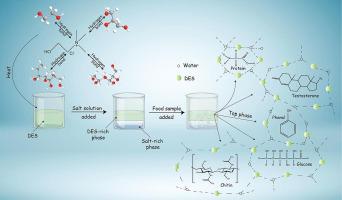Food Chemistry ( IF 8.5 ) Pub Date : 2022-11-28 , DOI: 10.1016/j.foodchem.2022.135079 Isaac Duah Boateng 1

|
Conventional organic solvents (e.g., methanol, ethanol, ethyl acetate) are widely used for extraction, reaction, and separation of valuable compounds. Although these solvents are effective, they have disadvantages, including flammability, toxicity, and persistence in the environment. Deep eutectic solvents (DESs) are valued for their biodegradability/low impact on the environment, low cost, and ease of manufacture. The objective of this review was to provide an overview of applications of DES in food chemistry, specifically in regard of extraction of polyphenols (e.g., anthocyanin, rutin, kaempferol, quercetin, resveratrol), protein, carbohydrates (e.g., chitin, pectins), lipids and lipid-soluble compounds (e.g., free fatty acids, astaxanthin, β-carotene, terpenoids), biosensor development, and use in food safety (pyrethroids, Sudan I, bisphenol A, Pb2+, Cd2+, etc.) over the past five years. A comprehensive analysis and discussion of DES types, preparation, structures, and influencing factors is provided. Furthermore, the potential and disadvantages of using DESs to extract biomolecules were assessed. We concluded that DES is a viable alternative for extracting polyphenols, carbohydrates, and lipids as well as use in food safety monitoring and biosensor development. However, more work is needed to address shortcomings, and determine whether using compounds extracted with DES can be consumed safely.
中文翻译:

评估低共熔溶剂在食品化学中的现状。潜力和局限性
常规有机溶剂(如甲醇、乙醇、乙酸乙酯)广泛用于有价值化合物的萃取、反应和分离。尽管这些溶剂是有效的,但它们也有缺点,包括易燃性、毒性和在环境中的持久性。低共熔溶剂 (DES) 因其可生物降解性/对环境的低影响、低成本和易于制造而受到重视。本综述的目的是概述 DES 在食品化学中的应用,特别是在多酚(例如花青素、芦丁、山奈酚、槲皮素、白藜芦醇)、蛋白质、碳水化合物(例如几丁质、果胶)、脂质和脂溶性化合物(例如,游离脂肪酸、虾青素、β-胡萝卜素、萜类化合物)、生物传感器开发以及在食品安全中的应用(拟除虫菊酯、苏丹红 I、双酚 A、2+ , Cd 2+等) 在过去的五年中。提供了对DES类型、制备、结构和影响因素的全面分析和讨论。此外,还评估了使用 DES 提取生物分子的潜力和缺点。我们得出结论,DES 是提取多酚、碳水化合物和脂质以及用于食品安全监测和生物传感器开发的可行替代方案。然而,需要做更多的工作来解决缺点,并确定使用 DES 提取的化合物是否可以安全食用。











































 京公网安备 11010802027423号
京公网安备 11010802027423号